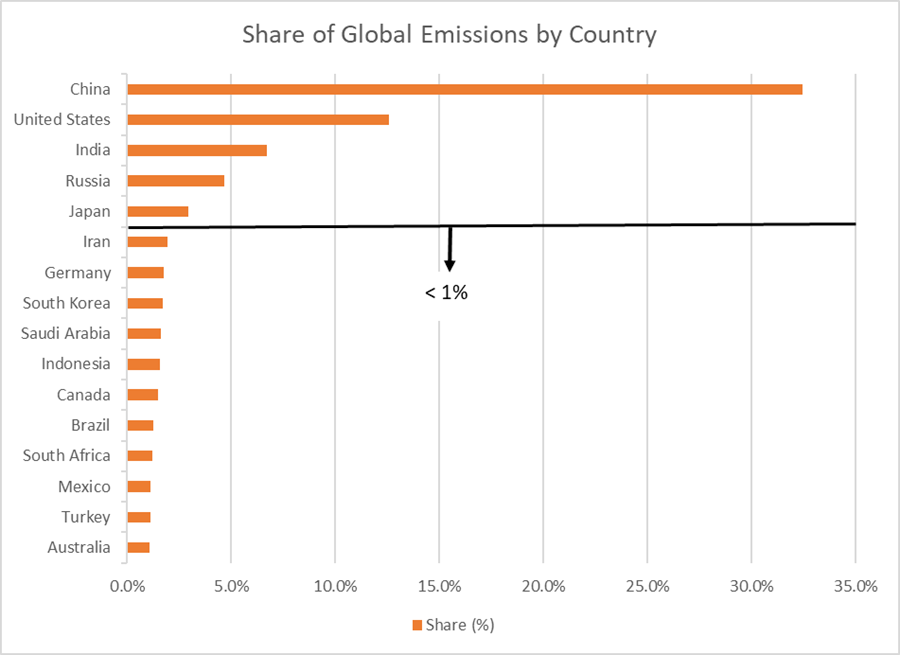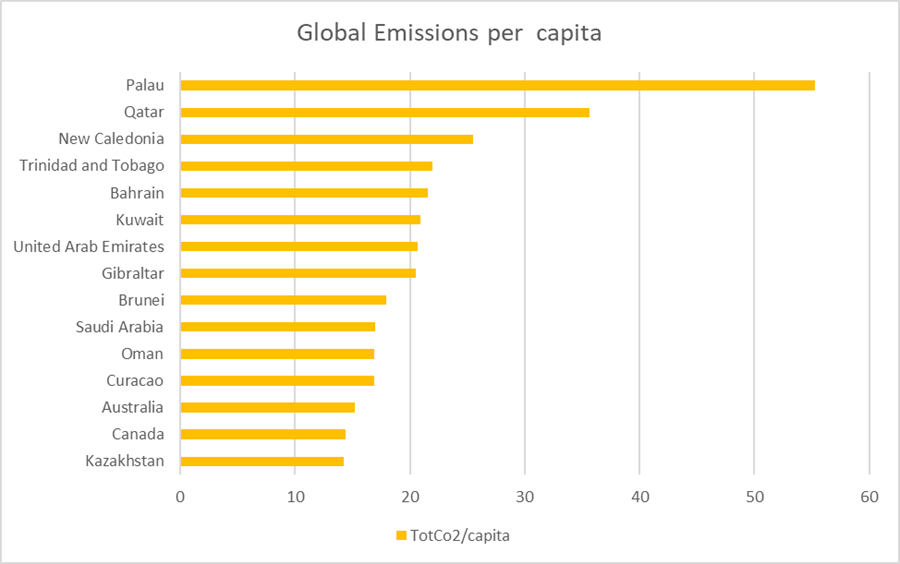Achieving Net Zero – A global problem requires global solutions
If you live in a relatively rich country (other than the United States), how often have you heard someone bemoaning government policies to cut carbon emissions say something like – “since we only emit about 1% of global CO2, we could cut our emissions to zero, and it would make no difference. It is the large emitters like China and the United States who have to lead, not us.”
Well, it is true that the United States and China account for about 45% of global emissions. But does that really mean that what the rest of us do doesn’t matter when it comes to combatting climate change?

Global emissions are indeed concentrated in a very few countries. In fact, the top 5 emitters, China, United States, India, Russia, and Japan account for about 60% of global emissions (2020 data). China is by far the leader at about 32%. Continuing down the list, there are only 16 countries that emit more than 1% of global emissions with the remaining 195 or so countries in the world each emitting less than 1% of global CO2.
Does this then mean the rest of us need do nothing? Do we look to the top 5 emitting countries to do it all on the assumption that our efforts are just not worth the outcome? Of course not. At the simplest level, if we truly want to achieve net zero emissions, and assuming the biggest emitters do their part, then we can get 60% (assuming they go to zero) of the way there, but another 40% of emissions would remain. There would still be much more to do with each remaining country contributing a little bit. It is somewhat similar to replacing coal plants with gas fired plants. A big help, yes – they cut emissions in half, but then what?

In any case, are emissions by country even the best metric when considering global policies to reduce carbon? What about individual emissions? It should come as no surprise that India and China are in the top 5 since about a quarter of the world’s population lives in these two countries alone. Yet if we look at where individuals use the most energy (and are responsible for the most individual emissions) it is in the smaller population richer countries. In this case the top 5 are: Palau, Qatar, New Caledonia, Trinidad and Tobago, and Bahrain. Of the big country emitters, the US is 16th on an individual level, Russia 23rd, Japan 29th, China 35th and India is way down the list at 133rd. This means that those countries that emit the most may use less energy per person than others but simply have very large populations. Can we expect India to do the heavy lifting to reduce emissions when every Indian used about 1/8 of the energy of the average American? Are small richer countries given a pass even though each resident emits a lot? Since access to affordable energy is directly related to quality of life, do poorer nations not have a right to a better life through using the same amount of energy of those in rich countries? (And of course, geography plays a part in energy use as does the current energy mix in each country, but this is beyond the scope of this discussion.)

Of course. the largest emitters need to show leadership as they will have the largest impact. But we cannot expect them to reduce their emissions at a cost to their people’s quality of life. And they cannot do it alone. Access to affordable low carbon energy including nuclear power is what is required for all the world’s population to prosper. Climate change is a global problem that requires global solutions. And that means cooperation. So next time someone tells you that even if we in smaller emitting nations reduce our emissions to zero it will make no difference, disagree. We can choose to lead, collaborate, or in some cases, even follow, but we cannot do nothing.




